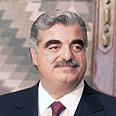
Emergency talks over Syria
Damascus may face international sanctions following arrests of pro-Syrian elements over Hariri murder
U.S. Secretary of State Condoleeza Rice and U.N. Special Coordinator for the Middle East Peace Process Terje Roed-Larsen held emergency talks Tuesday, following the arrests of five pro-Syrian security chiefs in Lebanon, suspected of being behind the assassination of former Lebanese prime minister Rafik Hariri.
American officials in Washington said the meeting was hastily arranged, following the "surprise" upon learning about the arrests.
The Arabic daily al-Shark al-Awsat has reported of tension in the Syrian capital, Damascus, following the arrests. suspected of being behind the assassination of former Lebanese prime minister Rafik Hariri.
One of the men arrested, a former Lebanese parliament member, was later released, but refused to speak to the media about his interrogation.
Yedioth Ahronoth reported Wednesday that the United States and France are planning to slap sanctions on Syria in the coming days, particularly against Syrian President Bashar Assad.
There are reports of direct links between Assad’s regime on the murder of former al-Hariri, following information obtained through the questioning of the commander of the Lebanese Presidential Guard, and three former intelligence chiefs.
In addition, Larsen and European Union Secretary-General Javier Solana decided to push off a visit to Beirut following the "dramatic and surprising developments," in the international investigation currently underway in Lebanon.
U.S. and U.N. officials declined to divulge details of the meeting.
'Syria failing to cooperate'
Last week, a U.N. Security Council session saw a German judge present a report on the al-Harir slaying, in which Syria was accused of failing to cooperate with the investigation. Israel and Jordan were praised in the report for their forthcoming help with the investigation.
A short time after the report, the American and French ambassadors went on a media offensive, and accused Syria of attempting to sabotage the investigation.
In Jerusalem, diplomatic sources told Ynet that sanctions on Syria were certainly a possibility, but said that such a move would not happen immediately. The U.N. Security Council was not fond of sanctions, using the measure only when faced with no choice, said one source.
Resistance to sanctions by the Arab bloc of U.N. members, who would try to torpedo such a step and help Syria to escape punishment, were also a factor in the timing of the sanctions.
A potential flashpoint between Syria and U.N. member states may take place during the U.N.’s annual convention in New York in two week’s time. Assad had planned on arriving at the convention, but recent developments have thrown such an appearance in doubt, a diplomat in Jerusalem said.
Last week, Syrian president Basher Assad spoke to the German weekly Der Spiegel, and said that the U.N.’s investigation committee was welcome to question whoever it wished.
Diana Bahur-Nir contributed to this report










